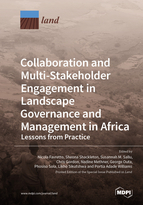Collaboration and Multi-Stakeholder Engagement in Landscape Governance and Management in Africa: Lessons from Practice
A special issue of Land (ISSN 2073-445X).
Deadline for manuscript submissions: closed (15 May 2020) | Viewed by 58514
Special Issue Editors
Interests: vulnerability; climate change adaptation; ecosystem services; landscape and livelihood change; transdisciplinarity
Special Issues, Collections and Topics in MDPI journals
Interests: climate-resilient development; sustainable land management and ecosystem service-based approaches to address climate change and poverty; sustainable energy for poverty reduction
Special Issues, Collections and Topics in MDPI journals
Interests: transdisciplinary research; research into use; integrated water management; SDG linkages; adaptation
Interests: ecosystem-based climate change adaptation; transdisciplinarity; inclusive landscape approaches; multi-level governance and collective action; transformation
Interests: governance issues; communication and advocacy; legal and regulatory aspects of environment and climate change
Interests: natural resource governance; climate resilience; value chains; gender; bioenergy
Interests: rural livelihoods; vulnerability and resilience; climate change and development
Interests: climate change adaptation; ecosystem services; biodiversity; conservation; ecology; landscapes and livelihood change
Special Issue Information
Dear Colleagues
Understanding the social and environmental impacts of multiple drivers of global and local change in Africa requires systemic and longitudinal place-based research. Landscapes provide the ‘ideal’ unit for this purpose, as well as for applying sustainable solutions that tackle complex—sometimes wicked—development and environmental challenges. Through a landscape approach, it is possible to explore the interaction between multiple sustainable development goals (SDGs), enabling understanding of the impacts of change and risk on biodiversity, ecosystem services, and livelihoods, as well as the implementation of locally appropriate and integrated response options. Indeed, landscape approaches have been widely promoted by government agencies, NGOs, and conservation organisations as a way for realising new pathways towards a more resilient future (e.g., https://peoplefoodandnature.org/about/). Synthesis work drawing on research from different landscape sites has helped to distil out a set of principles or conditions required for successful integrated, cross-scale landscape governance and management. A key condition that has received much emphasis is the need for stakeholder engagement and collaboration across the landscape.
Collaborative and multi-stakeholder governance and management of landscapes has the potential to promote the inclusion of marginalised voices, ensure appropriate actions and responses aligned to local concerns and needs, as well as bring frequently disconnected actors, sectors, and government institutions together in pursuit of the common goal of increased landscape resilience and sustainability. Moreover, meaningful collaboration that is accountable, inclusive, transparent, and legitimate can improve the chances that such partnerships will continue to function into the future. However, there is no single way to achieve effective collaboration. Different landscape projects have experimented with different entry points and engagement processes. This Special Issue aims to document these processes for engagement and collaboration, explore what has worked or not worked, identify what could be done better, and provide recommendations with the ultimate aim of providing practical guidelines for other landscape sites.
We invite contributors to develop case studies from their landscape sites that address (amongst others) a) how they began engaging with landscape actors and the approaches and tools they used for this, b) how they dealt with the challenges and power issues associated with bringing together landscape actors with different values and goals, c) how they facilitated knowledge co-production and how actions in the landscape were initiated, d) how they ensured ongoing collaboration, and f) what important lessons (including failures) have emerged, and what recommendations would they make for others working in landscapes. We also invite papers that synthesise findings on collaboration from multiple cases and/or deal with the theoretical aspects of what enables or constrains effective collaboration to build resilience in landscapes and livelihoods in Africa.
Authors who are interested in this Special Issue should submit abstracts (300 words) to [email protected] by 30 November 2019. These abstracts will be reviewed by co-editors and invitations made for the submission of full manuscripts.
Prof. Sheona Shackleton
Dr. Nicola Favretto
Prof. Chris Gordon
Dr. Nadine Methner
Dr. George Outa
Dr. Phosiso Sola
Dr. Susannah M. Sallu
Ms. Likho Sikutshwa
Ms. Portia Adade Williams
Guest Editors
Manuscript Submission Information
Manuscripts should be submitted online at www.mdpi.com by registering and logging in to this website. Once you are registered, click here to go to the submission form. Manuscripts can be submitted until the deadline. All submissions that pass pre-check are peer-reviewed. Accepted papers will be published continuously in the journal (as soon as accepted) and will be listed together on the special issue website. Research articles, review articles as well as short communications are invited. For planned papers, a title and short abstract (about 100 words) can be sent to the Editorial Office for announcement on this website.
Submitted manuscripts should not have been published previously, nor be under consideration for publication elsewhere (except conference proceedings papers). All manuscripts are thoroughly refereed through a single-blind peer-review process. A guide for authors and other relevant information for submission of manuscripts is available on the Instructions for Authors page. Land is an international peer-reviewed open access monthly journal published by MDPI.
Please visit the Instructions for Authors page before submitting a manuscript. The Article Processing Charge (APC) for publication in this open access journal is 2600 CHF (Swiss Francs). Submitted papers should be well formatted and use good English. Authors may use MDPI's English editing service prior to publication or during author revisions.
Keywords
- landscape approaches
- landscape governance
- landscape management
- stakeholder engagement
- collaboration
- case studies
- Africa








